 If I were writing this feature five years ago, I’d be lamenting the slow pace at which agents were adopting proptech. The fear of tech, however, is subsiding, and the questions ‘do we need an IT degree to understand it?’, ‘what if we prefer pen and paper?’ and ‘will it do my job better than me?’ are being replaced with ‘how much time can it save?’, ‘will I deal with less paperwork?’ and ‘what are the cost savings?’.
If I were writing this feature five years ago, I’d be lamenting the slow pace at which agents were adopting proptech. The fear of tech, however, is subsiding, and the questions ‘do we need an IT degree to understand it?’, ‘what if we prefer pen and paper?’ and ‘will it do my job better than me?’ are being replaced with ‘how much time can it save?’, ‘will I deal with less paperwork?’ and ‘what are the cost savings?’.
 William Reeve at Goodlord says we’re definitely at a point where the vast majority of agencies have at least experimented with software; “Some letting agents were very quick to see the benefits that technology can bring, whilst others have come round to the idea more slowly.” The use of Goodlord’s software is testament to greater adoption. “Demand for our services has increased year-on-year,” says William. “Once teams start using a platform like Goodlord, they soon realise how much time and admin stress they save, and how much bandwidth they gain to focus on clients and the wider health of their business.”
William Reeve at Goodlord says we’re definitely at a point where the vast majority of agencies have at least experimented with software; “Some letting agents were very quick to see the benefits that technology can bring, whilst others have come round to the idea more slowly.” The use of Goodlord’s software is testament to greater adoption. “Demand for our services has increased year-on-year,” says William. “Once teams start using a platform like Goodlord, they soon realise how much time and admin stress they save, and how much bandwidth they gain to focus on clients and the wider health of their business.”
Once teams start using a platform like Goodlord, they soon realise how much time and admin stress they save, and how much bandwidth they gain to focus on clients. William Reeve, CEO, Goodlord.
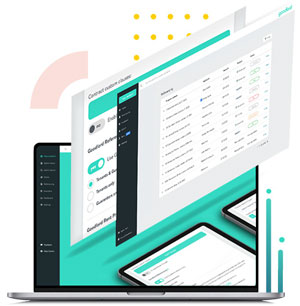
Goodlord – time and stress saver
Apps are one of the easiest pieces of proptech to understand. From online banking and Spotify to parking and fitness trackers, we’re comfortable with using a variety of third-party apps to streamline our lives. The same should be true in property – especially in lettings.
Today’s software apps have been designed to be user friendly, so the steep learning curve of the past is now the gentlest of inclines. Agents have rich pickings too. From all-encompassing platforms that automate almost every important – and laborious – task, to stand-alone services that allow staff to cherry pick what jobs are more digitised, agents can retain as much control as they like.
Time savings that can’t be ignored
So, just how much time can be saved when using apps? For agents that jump in with both feet and subscribe to Goodlord’s end-to-end lettings platform, a typical agency will benefit from automating 37 compliance steps and will remove 60 steps of duplication on each and every tenancy. William says this reduction in admin can triple the number of tenancy applications that can be processed with the same number of employees.
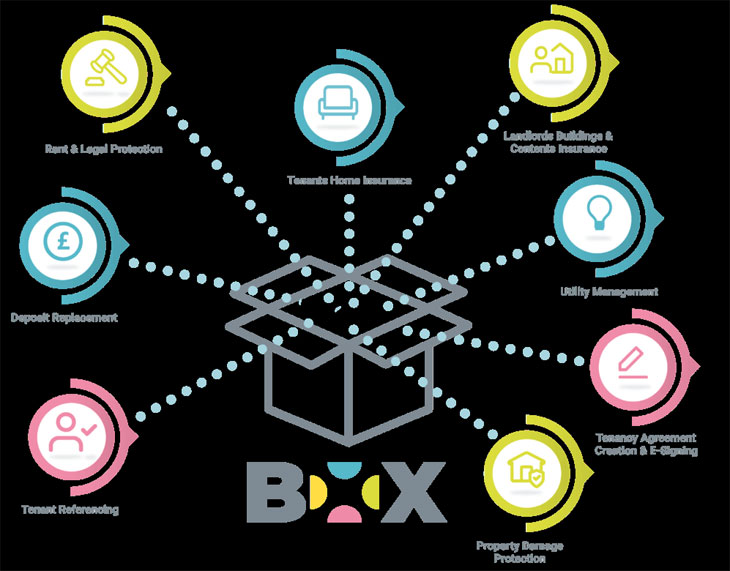
 The Lettings Hub – another end-to-end lettings platform – prefers to express its benefits with percentages. It says by automating 60 per cent of repetitive tasks it can shave an average of 60 per cent off the time required for tenancy set up. “By automating tasks – including tenant referencing, Government-approved digital Right to Rent checks, the creation and distribution of tenancy agreements, and digital signatures – agents can prioritise building client relationships and expanding their business, while significantly reducing administrative burdens,” comments The Lettings Hub’s Heidi Shackell. Automatically more efficient, Heidi also highlights how its BOX software can enhance accuracy, especially regarding compliance. “Manual processes are prone to human error, potentially leading to legal and financial complications. BOX’s functions – such as the automatic issuing of mandatory documents – reduces the risk.”
The Lettings Hub – another end-to-end lettings platform – prefers to express its benefits with percentages. It says by automating 60 per cent of repetitive tasks it can shave an average of 60 per cent off the time required for tenancy set up. “By automating tasks – including tenant referencing, Government-approved digital Right to Rent checks, the creation and distribution of tenancy agreements, and digital signatures – agents can prioritise building client relationships and expanding their business, while significantly reducing administrative burdens,” comments The Lettings Hub’s Heidi Shackell. Automatically more efficient, Heidi also highlights how its BOX software can enhance accuracy, especially regarding compliance. “Manual processes are prone to human error, potentially leading to legal and financial complications. BOX’s functions – such as the automatic issuing of mandatory documents – reduces the risk.”
Manual processes are prone to human error, potentially leading to legal and financial complications. BOX’s functions such as issuing mandatory documents – reduce the risk. Heidi Shackell, MD, The Lettings Hub.
 Yielding to automation is something agents have grappled with in the past, as it acknowledges that tech can be more accurate, competent and efficient than the human touch. John Antill at Brightchecker thinks people together with proptech is the best combination. “As humans we naturally don’t like change and it takes time to transition to a new way of doing things. This applies to agents who are happy with a manual process. The best property apps allow agents to conduct inspections more efficiently than they ever could manually.”
Yielding to automation is something agents have grappled with in the past, as it acknowledges that tech can be more accurate, competent and efficient than the human touch. John Antill at Brightchecker thinks people together with proptech is the best combination. “As humans we naturally don’t like change and it takes time to transition to a new way of doing things. This applies to agents who are happy with a manual process. The best property apps allow agents to conduct inspections more efficiently than they ever could manually.”
As humans we naturally don’t like change … the best property apps allow agents to conduct inspections more efficiently than they ever could manually. John Antill, Co-Founder, Brightchecker.
The Brightchecker inspection app is smart device friendly and can be used when undertaking Fitness for Human Habitation checks, Legionnaires assessments and HMO management checks, as well as inventories. The app’s checklists are brilliant in their own right but are fully customisable and can include photos, as well as comments.
“Brightchecker offers accuracy and consistency, which are two important factors when capturing home inspection data,” adds John. “Our reports are clear and concise.”
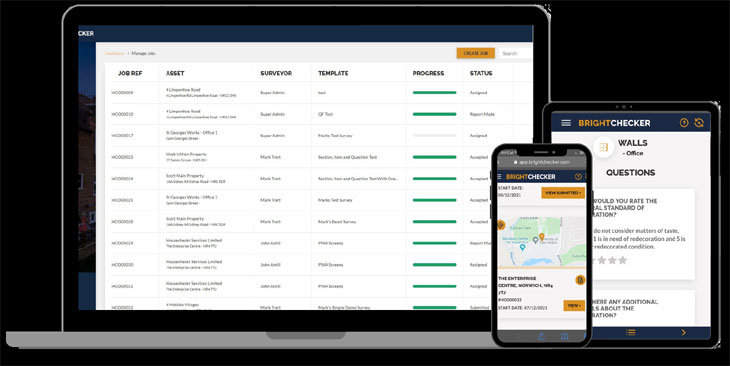
Say goodbye to data duplication
Integration with existing CRMs and software platforms, including Alto, Reapit, Gnomen, Qube, MRI, SME Professional, Rightmove Referencing, Fixflo, Jupix, Acquaint, Let Tech Solutions and PropCo, to name a few, is where apps have a key advantage. Debunked, this means the initial data entered into one system can be seamlessly transferred to another – with fields automatically populated and double data entry avoided.
The Lettings Hub has just announced a trio of fresh partnerships. Its new integration with Reapit will allow agents to create tenancies using the data already held within the CRM, while integrating with Home Telecom will automate the utility notification and switching stages. Finally, its integration with live chat software provider Tawk will give letting agents, landlords and tenants another channel of direct communication with The Lettings Hub. Likewise, The Depositary is celebrating two new integrations – ACT Property and Hinch PM – which join Inventory Hive, Inventory Base and No Letting Go/Kaptur.
One of The Depositary’s existing integrations is with the Tenancy Deposit Scheme (TDS), who has developed TDS API – an interface that allows property management software and customer management tools to work together seamlessly. Features, such as transferring deposit registration details at the click of a button, being able to download proof of deposit protection and easily transferring deposits, enhance in-branch productivity.
This automation has not only simplified deposit administration but has led to an overall increase in work efficiency. Operations have become streamlined. Debbie Davies, Head of Sales, TDS.
 “The feedback from our agents demonstrates how invaluable this solution is,” comments Debbie Davies. “This automation has not only simplified deposit administration but has led to an overall increase in work efficiency. Operations have become more streamlined, resulting in considerable time and cost savings.”
“The feedback from our agents demonstrates how invaluable this solution is,” comments Debbie Davies. “This automation has not only simplified deposit administration but has led to an overall increase in work efficiency. Operations have become more streamlined, resulting in considerable time and cost savings.”
All in one place
As well as new integrations, the beauty of apps is the ability to launch new features within the software. Inventory Hive – property inventory software that can automate tenant feedback, compliance reminders and inspection scheduling – already has 360° cameras built into its app. Now it has launched a diary management function with Google Maps integration, which negates the need to switch between multiple apps when managing property visits. There’s full suite of automated tenant communications, including recurring scheduling and appointment confirmations, while the map function allows for efficient route planning, travel and time calculations, and mileage monitoring.
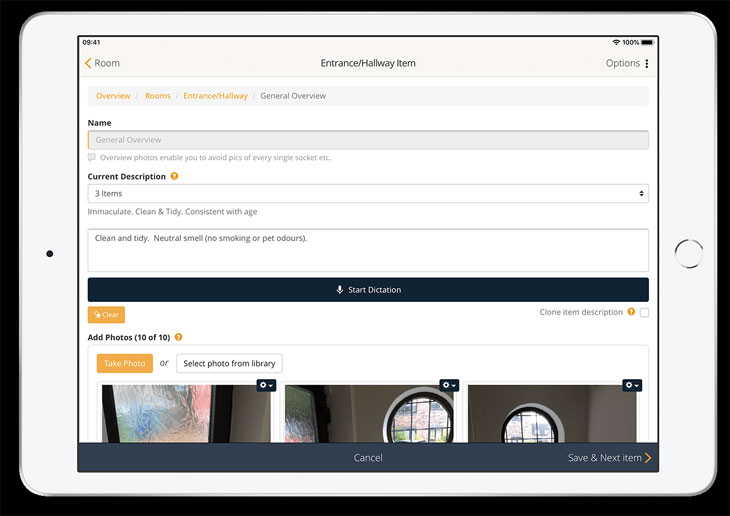
 The company’s Richard Abbots says the launch was prompted by its research that showed coordinating property inspections is one of the most time-consuming admin tasks a property manager can undertake. “Our new feature helps save property managers up to 20 minutes in office admin time for every single interim visit that’s scheduled. For a 250 property portfolio with 6 monthly interim visits, that’s just shy of 14 hours saved each month.”
The company’s Richard Abbots says the launch was prompted by its research that showed coordinating property inspections is one of the most time-consuming admin tasks a property manager can undertake. “Our new feature helps save property managers up to 20 minutes in office admin time for every single interim visit that’s scheduled. For a 250 property portfolio with 6 monthly interim visits, that’s just shy of 14 hours saved each month.”
Our new feature helps save property managers up to 20 minutes in office admin time for every single interim visit that’s scheduled. For a 250 property portfoli–14 hours a month. Richard Abbot,s CEO, Inventory Hive.
App can earn agents income
 One Utility Bill’s ‘Notify’ service is another app trading on its ability to save time, specifically during the check in, check out and void stages. “Notify takes utility registration out of agents’ hands entirely, saving an enormous amount of time that would be spent on the phone and sorting admin,” says the company’s Sophie Humble.
One Utility Bill’s ‘Notify’ service is another app trading on its ability to save time, specifically during the check in, check out and void stages. “Notify takes utility registration out of agents’ hands entirely, saving an enormous amount of time that would be spent on the phone and sorting admin,” says the company’s Sophie Humble.
Notify takes utility registration out of agents’ hands entirely, saving an enormous amount of time that would be spent on the phone and sorting admin. Sophie Humble, One Utility Bill.
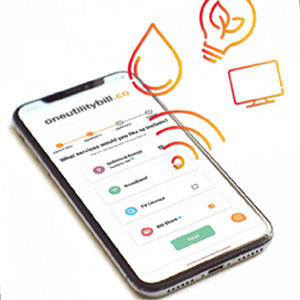
As well as ending endless calls to gas, electricity and water suppliers, Notify allow agents to earn commission – something that’s possible with a number of other apps too. “Agents can earn up to £4,320 per year in commission based on 20 move-ins per month,” adds Sophie. “Notify integrates with a range of existing CRMs, so there’s a good chance agents can get set up with just a few clicks, with no need to learn any new systems.”
 Notify is among a breed of property apps that involve the agent and the tenant. In Notify’s case, the new tenant gets an email and a telephone call telling them who the incumbent utility suppliers are, as well as details of alternative packages that may save them money. The Depositary is moving in similar circles by actively contacting renters. Its app is devoted to making the deposit recovery process as streamlined as possible for everyone involved. “We aim to reduce the admin burden of tenancy conclusions by up to 90 per cent,” says The Depositary’s Kristjan Byfield.
Notify is among a breed of property apps that involve the agent and the tenant. In Notify’s case, the new tenant gets an email and a telephone call telling them who the incumbent utility suppliers are, as well as details of alternative packages that may save them money. The Depositary is moving in similar circles by actively contacting renters. Its app is devoted to making the deposit recovery process as streamlined as possible for everyone involved. “We aim to reduce the admin burden of tenancy conclusions by up to 90 per cent,” says The Depositary’s Kristjan Byfield.
Manual work that would have taken three to four hours has been reduced to as little as 15 minutes, while tenants are reunited with their deposits more quickly. Kristjan Byfield, Co-Founder, The Depositary.
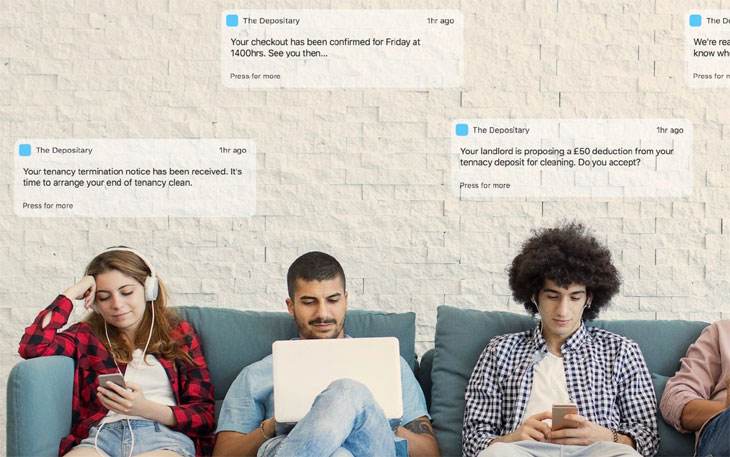
“Our platform automates many of the tasks involved with the end of tenancy stage. The process starts once notice has been given and is managed all the way to refund and/or a dispute,” adds Kristjan. “Agents using The Depositary have found manual work that would have taken three to four hours has been reduced to as little as 15 minutes, while tenants are reunited with their deposits more quickly. Our agents currently average deposit refunds of just 11 days, versus the national average of 21.”
More in touch with tenants
Such efficiencies can be attributed to the app’s two-pronged attack. In the four weeks before their tenancy ends, the app automatically notifies tenants of when their check out is taking place and what is expected in terms cleaning, with the app even recommending cleaning companies. It’s a cajoling dialogue with renters designed to help avoid deductions and disputes.
Apps like The Depositary offer us tantalising glimpses of the future, showing how the relationship between letting agents, property managers and tenants can be responsive, dynamic, holistic and app based. It’s an exciting new communication blueprint that is fast developing at Spike.
Its two software products are currently finding favour with build-to-rent, new development and estate managers. Spike Lettings manages the end-to-end tenant journey in a traditional way but also offers a nifty reservation facility, during which a property is taken off the website for 30 minutes while the tenant pays a reservation fee, thanks to integrations with payment platforms.
Creating a new lettings lifestyle
It’s Spike Living that’s the most mouldbreaking, however, with emphasis on an instant messaging service that replicates the speed, responsiveness and familiarity of WhatsApp, and a lifestyle-driven platform that has echoes of social media.
 “Today’s Generation Rent want one place to manage their tenancy and that’s on their mobile phone,” says Spike’s Jonny Wootten. “Having a quick way to message an agent or property manager is good for building a rapport. Young renters are not always comfortable picking up the phone and they consider emails quite formal.”
“Today’s Generation Rent want one place to manage their tenancy and that’s on their mobile phone,” says Spike’s Jonny Wootten. “Having a quick way to message an agent or property manager is good for building a rapport. Young renters are not always comfortable picking up the phone and they consider emails quite formal.”
Generation Rent want one place to manage their tenancy and that’s on their mobile phone. Having a quick way to message an agent or property manager is good for building a rapport. Jonny Wootten, Marketing Director, Spike Living.
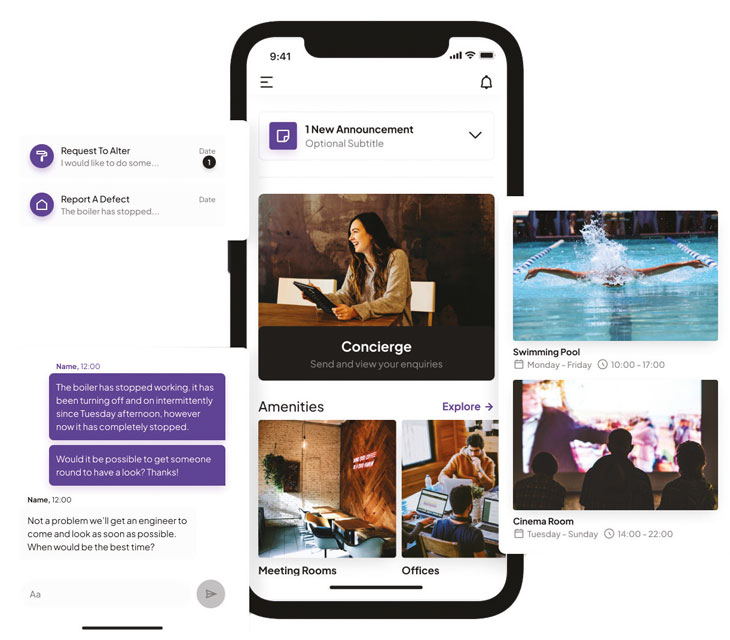
Instant messaging’s on-screen push notifications also dial into more modern way to keep up to date and agents can exploit this. “Property managers can notify tenants that new versions of documents have been published, send ‘to all’ messages for those living in a block and start a chat with an individual renter,” adds Jonny. “App-based messaging is a natural way to communicate and managers are more likely to get a response.”
The friendly Spike interface also yields practical functions. From the app, tenants can view appliance manuals, instruction videos and fire safety procedures, log and track maintenance issues, make payments and book shared amenities. More than this, the app strives to build new communities through engagement, with the ability to connect tenants who have shared interests, offer renters discounts at local businesses and even provide live travel feeds.
Time is money
For everyone in business, time is the most precious commodity and as the saying goes, ‘time is money’. Those who embrace the right time-saving technology can use that time elsewhere to grow the business. And it can provide, potentially, a more efficient and consistent service, appreciated by staff and clients alike.
 The Negotiator The essential site for residential agents
The Negotiator The essential site for residential agents




Please note: This is a site for professional discussion. Comments will carry your full name and company.